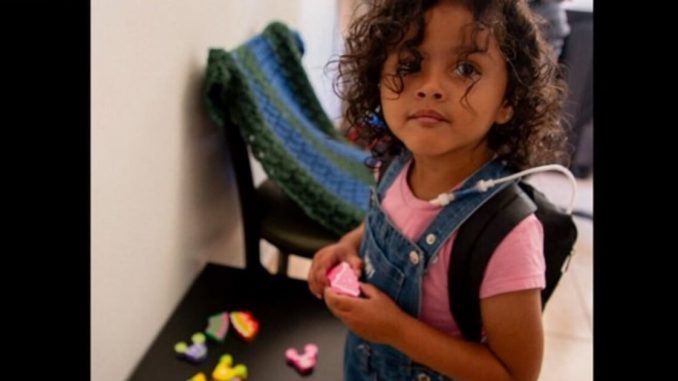
| Published June 2, 2025
In an apparent political backfire, Democrats quickly pounced on former President Donald Trump after a widely circulated report suggested that his immigration policies led to the deportation of a 4-year-old girl with a life-threatening medical condition. The child, Sofia Vargas, has been receiving treatment in Los Angeles since 2023. The emotional headlines prompted a wave of criticism aimed at Trump, framing the situation as an example of cruelty under Republican immigration leadership.
Prominent Democrat lawmakers and progressive activists took to social media and mainstream news platforms, accusing Trump of “ripping families apart” and targeting children for deportation. Hashtags like #SaveSofia and #CrueltyIsThePoint trended within hours, with commentators leveraging the story to bolster opposition to Trump’s 2024 campaign momentum.
A 4-year-old girl was legally admitted to the U.S. to access essential healthcare for a life-threatening condition.
Now, the Trump Administration is forcing her family to leave — despite doctors warning it could kill her.
I joined @RepLuzRivas and @SenAdamSchiff in urging… pic.twitter.com/PvvYSWhSM9
— Senator Alex Padilla (@SenAlexPadilla) May 29, 2025
However, the narrative quickly began to unravel.
According to an official statement from the Department of Homeland Security (DHS), Sofia and her family are not being deported. The agency clarified that their application for continued humanitarian parole is still under review, directly contradicting media claims and Democratic accusations.
“Any reporting that Vargas and her family are actively being deported are FALSE,” the DHS statement read. “This family applied with USCIS for humanitarian parole on May 14, 2025, and the application is still being considered.”
The family initially arrived in the United States in July 2023 through the Biden administration’s CBP One app, a platform designed to manage asylum and parole claims more efficiently. They were granted emergency visas specifically to obtain life-saving medical treatment for Sofia in Los Angeles.
This backlash against Trump was premature and misinformed, especially given that the family was admitted under policies enacted during the Biden administration. Trump supporters argue the episode is a clear attempt to manufacture outrage using a child’s condition as emotional leverage.
Critics of the Biden administration also point out that the situation highlights flaws in the current immigration system, particularly the uncertainty surrounding humanitarian parole and how these cases are handled bureaucratically.
In the end, this controversy may have done more harm than good to Trump’s opponents. What was meant to be a political indictment may ultimately serve as a cautionary tale: facts still matter, even in an election cycle.
The implications of this story—and its rapid unraveling—are significant on several political and policy fronts:
1. Credibility Crisis for Trump’s Opponents
The Democrats’ rush to blame Trump without verifying facts handed him a political advantage. By reacting to inaccurate reporting, they risk eroding public trust in their messaging, especially on sensitive topics like immigration and healthcare for children.
2. Immigration Policy Scrutiny
While the case was misrepresented, it still brings renewed attention to the murky and complex nature of U.S. immigration processes, particularly under the humanitarian parole system. It exposes how vulnerable families can be caught in bureaucratic limbo—and how easily misinformation can be weaponized for political purposes.
3. Media Accountability
The media outlets and commentators who prematurely pushed the deportation narrative may face scrutiny over journalistic standards. In an era where disinformation is a growing concern, this incident could add pressure on both mainstream and alternative outlets to verify claims before publication.
4. Reinforcement of Trump’s Messaging
For Trump and his supporters, this incident feeds into their long-standing criticism of the media and political establishment as dishonest or opportunistic. It also allows him to position himself as a victim of false attacks—an angle he has effectively used in past campaigns.
5. Public Fatigue and Desensitization
Overblown or false alarms—especially involving children—may desensitize the public, potentially dulling the impact of future, legitimate humanitarian concerns. It underscores the need for accuracy and care when invoking emotionally charged stories.
Overall Takeaway:
The attempted political attack on Trump over the supposed deportation of a sick 4-year-old girl has backfired, revealing a rushed and inaccurate narrative pushed by some Democrats and media outlets. With DHS confirming that the child and her family are not being deported and their humanitarian parole is still under review, the incident underscores the dangers of exploiting emotionally charged stories without verifying facts. Instead of damaging Trump, the controversy has bolstered his claims of media bias and political smear tactics—while raising legitimate concerns about transparency and accountability in immigration reporting.
SOURCES: THE GATEWAY PUNDIT – BACKFIRE: Democrats Pounce on Trump After Seeing Report About Mexican Girl Facing Active Deportation Despite Suffering from a Rare and Fatal Disease…Then the Full Story Emerges
TOWNHALL – Trump Gets the Last Laugh After Dems Accuse POTUS of Deporting Sick 4-Year-Old





Be the first to comment